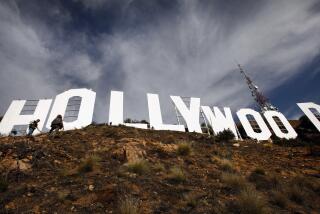The Millennium Is Upon Us, but the Party’s Already Over
- Share via
Now comes the real millennium, shuffling in, already looking like an afterthought before it’s even arrived.
How could it be otherwise, given what happened last year when the pretender to the century’s end put on such a show? All those fireworks, from Paris to Hong Kong to Sydney.
Remember all those commemorative millennial cruises? Or the Las Vegas concert by Barbra Streisand where tickets went for $2,500 a head? Or perhaps the much-ballyhooed opening in London of the multimillion-dollar Millennium Dome?
This year, there are no cruises and no Streisand, though Vegas does promise memorable midnight fireworks. And the Millennium Dome was such a flop that it’s closing this month.
The offerings for Dec. 31 will be relatively meager, indeed, though it is acknowledged by those paid to know that Jan. 1, 2001, is the true beginning of the millennium, the opening day of the third thousand-year period since the birth of Jesus.
The U.S. Naval Observatory in Washington, D.C., the nation’s official timekeeper, will mark the moment by sending a four-foot aluminum ball down a 40-foot pole atop its headquarters. Closer to home, a dusk-to-dawn rave extravaganza has been booked for the Los Angeles Memorial Coliseum and Sports Arena on New Year’s Eve. Laker star Shaquille O’Neal is renting out the Staples Center for his own personal extravaganza featuring Destiny’s Child, Jon B. and Ideal. Disneyland will stay open until 3 a.m. and various other fairs and festivals will dot the Southern California landscape.
But that’s a pale comparison to last year, when hour upon hour of television programming from around the world was devoted to events celebrating the millennium that really wasn’t. Futurist author Ray Bradbury, who openly scoffed at last year’s faux millennium, has a theory about why so many embraced the year 2000: “Because it looked so pretty,” he said. “All those zeros. It looked beautiful.”
That rounded numerical look was, of course, combined with mega-media hype, a legion of money-hungry opportunists and the shrill alarm of the Y2K computer glitch.
The 2001 brushoff concerns Jeff De Tray, who has a Web site on which a digital clock is counting down to the New Year. The New Hampshire resident, retired at age 49 from the computer publishing business, said he hardly focused on the “millennium 2000” craze as it began building in early 1999.
“I thought that pretty soon the smart people would rise up and say something,” De Tray said. “I assumed it would pretty much take care of itself.”
Not so. The 2000 fervor grew exponentially. And De Tray countered by establishing his Web site, mostly as a somewhat lonely way of serving notice that not everyone had been duped. “When public opinion can determine what is a fact, that’s not a good thing,” he said.
Still, the scattering of real millennialists remain loyal to their cause. One is John Hamilton Scott, a Los Angeles County deputy public defender who has spent more than his share of time trying to set people straight about the millennium. He has sent letter upon letter vainly spreading the word. Now, with the millennium at hand, he sees another reason for it to begin this Jan. 1: “That way, we can consign the last election to the 20th century.”
To briefly recap the calendar controversy: Around the year 252 a monk named Dionysius Exiguus, a.k.a. Dennis the Short, created a calendar in which he assigned AD 1, not zero, as the date of Christ’s birth.
More than 1,000 years later, Pope Gregory XIII ordered the calendar reformed but still kept AD 1 as the starting point. Thus, the start of the second millennium was 1001 and the beginning of the third is 2001.
Straightforward? Perhaps, but not to all. Indeed, it has been a topic of discussion, for centuries. For instance, in the Dec. 26, 1799, edition of the Times of London, inquiring readers were berated for asking whether the century was ending on Jan. 1, 1800. “It is a silly, childish discussion, and only exposes the want of brains of those who maintain a contrary opinion,” the Times chided.
In the United States, the new century was heralded by the Hartford Courant in January 1801 with a poem beginning, “Precisely twelve o’clock last night, the Eighteenth Century took its flight.”
Ninety-nine years later, there was no mention of the millennium in the Jan. 1, 1900, edition of the Los Angeles Times. Rather, it was the lead story the following year, describing in great detail a jubilant celebration in New York, with fireworks and “bombs and tin horns” supplying the noise.
Given last year’s global celebration, that kind of millennial raucousness isn’t about to happen this time around. Listen to party consultant Sherri Foxman, who runs a Cleveland-based service called Party 411: “I don’t know anyone who is actually celebrating the ‘real’ millennium. We get upwards of 1,000 e-mails a week with requests for assistance, and I haven’t seen a one.”
In truth, last year’s festivities had its own share of flops. That was especially true in Los Angeles, which greeted the New Year with a resounding thud. Besides the lack of a blockbuster public event, there were many empty restaurant tables and vacant hotel rooms here, as there were in some other major cities.
“Keep in mind that people wouldn’t pay big bucks for the millennium parties last year,” Foxman said. “Hotels and restaurants tried to double and triple their prices because of the ‘turn of the century’ thing going on, and not too many people bought into it.”
This time around, the celebrations--or lack thereof--will be on a city-by-city basis. Denver should be active because the streets were almost deserted last year. With post-Super Bowl plunder fresh in civic memory, an army of police officers was dispatched to keep a lid on raucous crowds, dampening the celebratory mood into nonexistence. To make up this year, the city has even hired the fireworks expert who engineered the spectacular Paris show last year.
Seattle, meanwhile, isn’t doing much to make up for last year, when the city was virtually shut down for fear of riots like those weeks earlier protesting the World Trade Organization, coupled with fears of terrorist bombers.
This year, though, the city’s Cabaret de Paris is throwing a “Real Millennium New Year’s Eve Gala,” jokingly aimed at “those highly accurate mathematician, astrology and History Channel types.”
Back in New England, De Tray isn’t about to go out and mingle with New Year’s Eve drunks. He’ll stay home as usual. Ditto for attorney Scott in Los Angeles, who will adhere to his New Year’s Eve tradition of dressing up in a tux and cooking dinner for his formally clad wife.
And then there is Jim Bergevin, who headed up a small band of the faithful called the Real Millennium Group. His main complaint these days is that the beginning of the millennium will go unnoticed.
“My feeling is that the media has completely ignored the whole thing, especially television,” said Bergevin, the manager of the 12-lane Slocum’s Bowl-O-Drome in Lawrenceville, N.J. “They’ve completely ignored the truth.”
And how will Bergevin spend the beginning of the real millennium? The same way he did last year: hosting an open bar and buffet at the bowling alley. All you can eat and drink for $60, bowling extra.
(BEGIN TEXT OF INFOBOX / INFOGRAPHIC)
An Opinion From a Century Past
“We have uniformly rejected all letters, and declined all discussion upon the question of when the present century ends as it is one of the most absurd that can engage the public attention, and we are astonished to find it has been the subject of so much dispute, since it appears to be perfectly plain. The present century will not terminate till January 1, 1801, unless it can be made out that 99 are 100. Eighteen centuries are 1800 years, then how can 18 centuries be completed till the year 1800 has expired? What is the meaning of a century, but a clear distinct series of 100 years? How can 100 be completed by 99? . . . We shall not pursue this question further, nor should we now have said so much upon it, had not several applications been made for our opinion. It is a silly, childish discussion, and only exposes the want of brains of those who maintain a contrary opinion to that we have stated.”
--From the London Times, Dec. 26, 1799
More to Read
Sign up for The Wild
We’ll help you find the best places to hike, bike and run, as well as the perfect silent spots for meditation and yoga.
You may occasionally receive promotional content from the Los Angeles Times.






